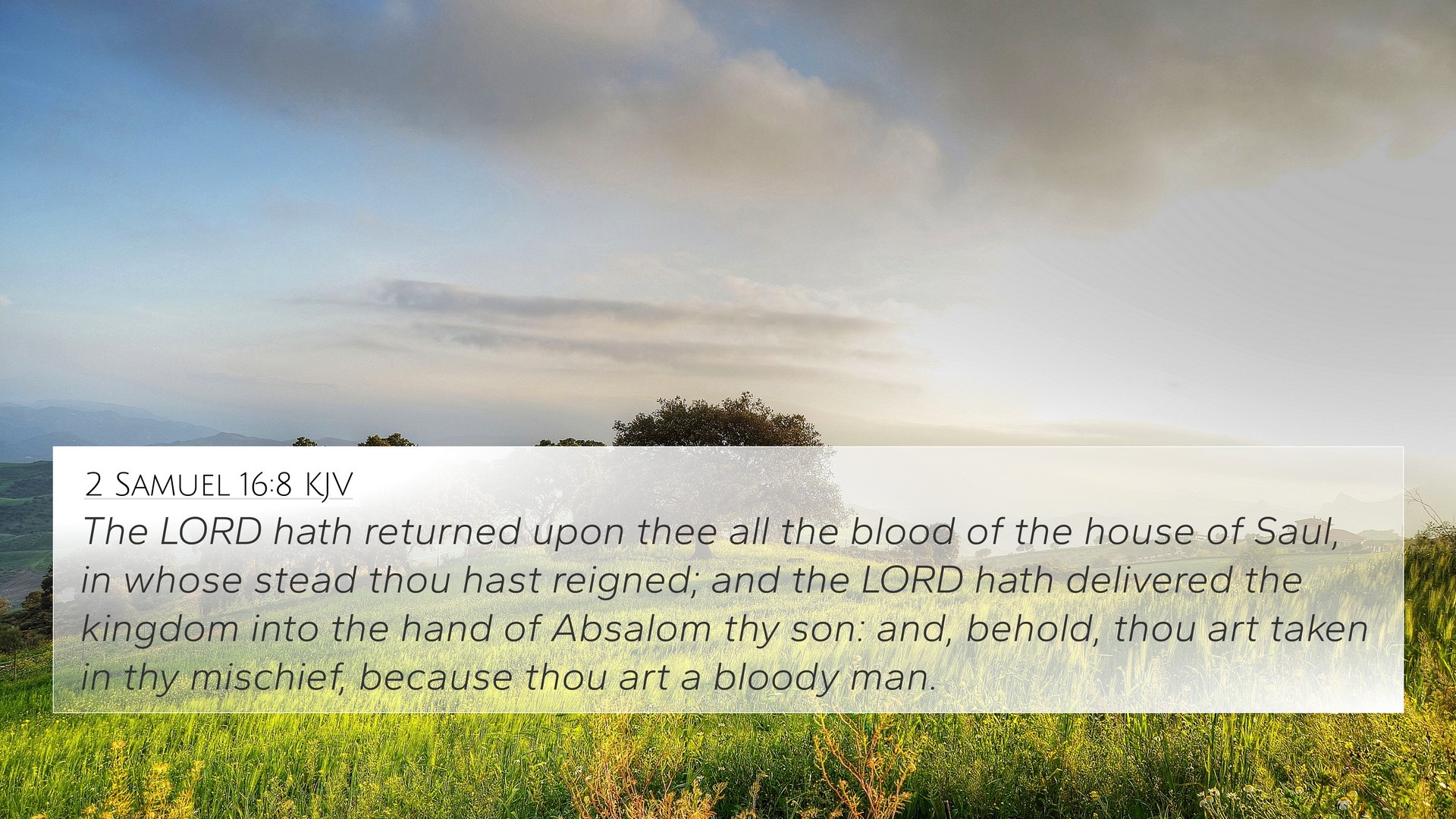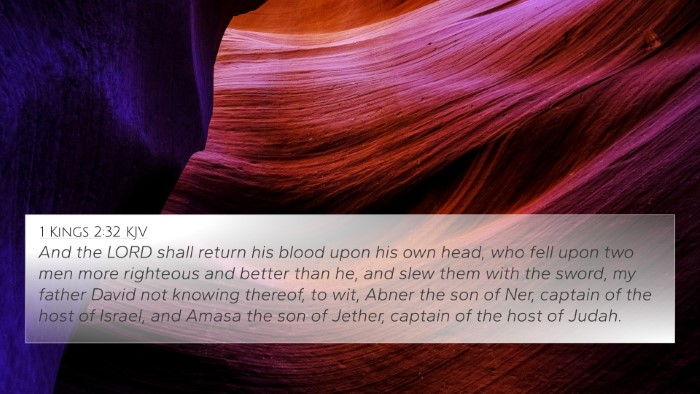Understanding 2 Samuel 16:8
Verse Context: 2 Samuel 16:8 states, "The Lord has returned upon you all the blood of the house of Saul, in whose stead you have reigned; and the Lord has delivered the kingdom into the hand of Absalom your son: and behold, you are taken in your mischief, because you are a bloody man." This verse is set against the backdrop of King David's tumultuous reign and the rebellion led by his son Absalom.
Summarized Meaning
2 Samuel 16:8 is a critical observation of the consequences of kingly actions and divine judgment. The character Shimei curses David for his past actions against Saul's house, which is interpreted as a reminder of the justice that befalls the wrongdoers. Shimei's accusations underscore the theme of divine retribution, suggesting that David's current sufferings are tied to his previous sins.
Insights from Public Domain Commentaries
- Matthew Henry: Henry outlines the idea that God’s providence often uses others to execute justice. He suggests that the calamities facing David were indicative of righteous retribution for the shedding of innocent blood, particularly in the context of Saul's family.
- Albert Barnes: Barnes emphasizes Shimei's role as an instrument of God’s judgment, highlighting that while David was a man after God’s own heart, he was not exempt from accountability for his actions, particularly regarding Saul's family.
- Adam Clarke: Clarke elaborates on the historical context of the verse, asserting that it reflects the broader narrative of David’s life, showcasing both his triumphs and his failures, and illustrating that divine justice operates across generations.
Key Themes
This verse encapsulates several important themes in the Bible:
- Consequences of Sin: Reflects the principle in Scripture that actions have repercussions, particularly in leadership.
- Divine Justice: Illustrates the theme that God holds individuals accountable and uses circumstances, like rebellion, to enact justice.
- Role of Prophecy: Emphasizes how prophetic voices (like Shimei) can reveal God's judgment.
- Human Frailty: Underscores the idea that even revered figures like David can fall and face repercussions for their choices.
Cross-References
This verse connects with the following Bible verses, illustrating the interconnectedness and themes of justice, accountability, and God's sovereignty:
- 2 Samuel 1:14: David mourns the death of Saul, showcasing the complexity of his relationship with the former king.
- 1 Kings 2:32: Agrees with the theme of divine judgment surrounding bloodshed, reinforcing justice in leadership.
- Galatians 6:7: “For whatever a man sows, that will he also reap,” reiterating the principle of accountability.
- Psalm 109:5: David speaks of his adversaries' unjust treatment, reflective of the reagents he faces in 2 Samuel 16.
- 2 Samuel 12:9: Highlights Nathan confronting David regarding Uriah's murder, reaffirming the consequences of David's actions.
- Romans 2:6: Paul explains that God will repay everyone according to their deeds, mirroring the ideas in 2 Samuel 16:8.
- 2 Samuel 15:30: David weeps as he flees Jerusalem, marking the opening of description of his downfall.
- Job 4:8: Eliphaz mentions the just fate of those who do wrong, similar to David’s scenario.
- Exodus 20:5: God warns of visiting iniquities upon the children, a reminder of generational consequences pertaining to sin.
- Proverbs 4:19: The way of the wicked is like darkness, suggesting the ailment of David's sins illustrated in his downfall.
Conclusion
2 Samuel 16:8 serves as a powerful reminder of the interconnectedness of biblical narratives and the weight of leadership responsibilities. The verse and its commentaries provide rich insight into the themes of justice, accountability, and divine intervention. Through cross-referencing, we can appreciate the profound implications present across scripture, ultimately leading to a deeper understanding of the moral and spiritual lessons contained in God's word.
Further Study Tools
For those interested in exploring connections between Bible verses further, consider these tools:
- Bible Concordance: A comprehensive guide to finding verses and their meanings.
- Bible Cross-Reference Guide: Tool for understanding relationships between different scriptures.
- Cross-Reference Bible Study: Methods of studying the Bible through interconnected verses.
- Bible Reference Resources: Materials that help with deeper understanding and analysis of scripture parallels.













